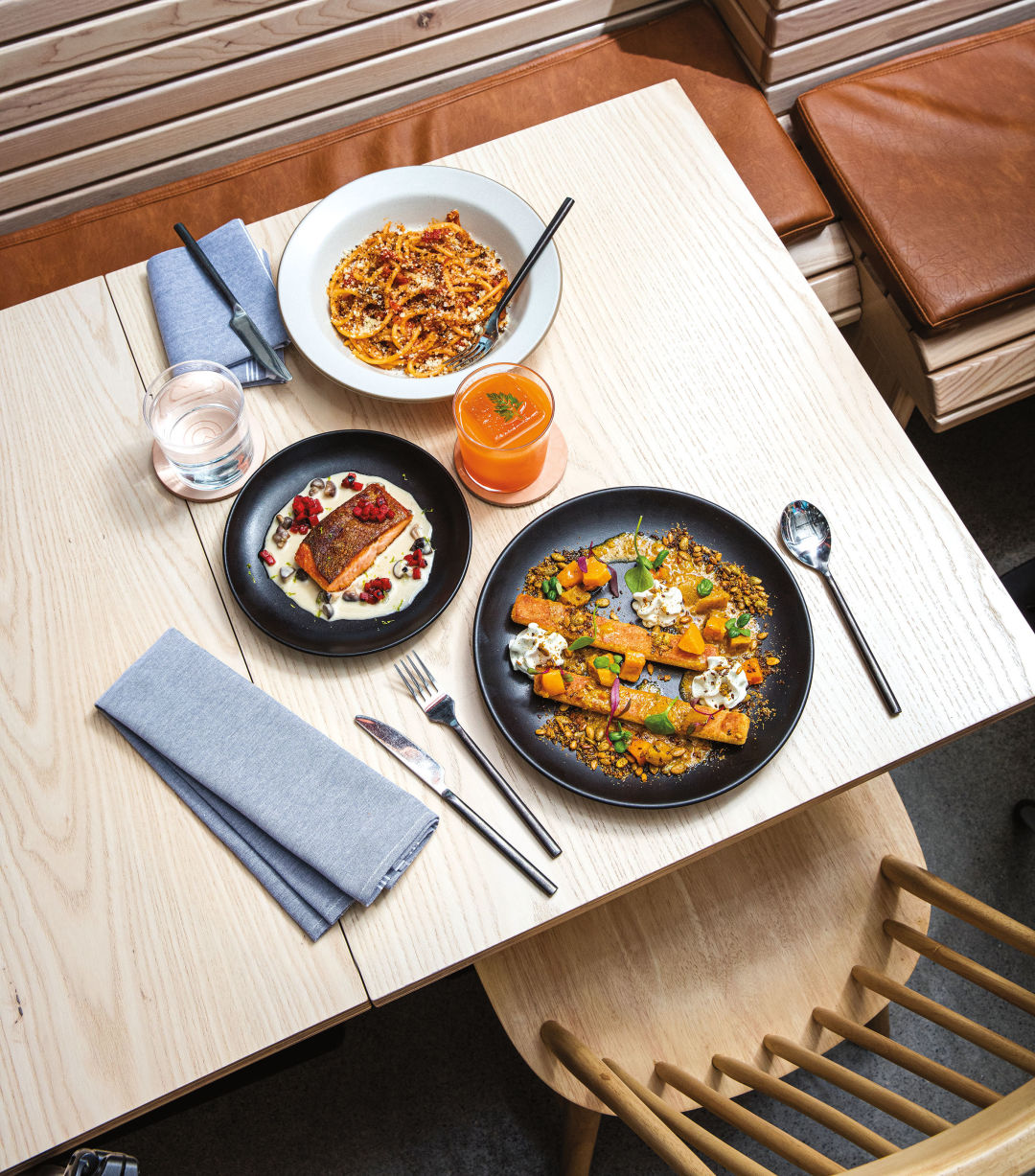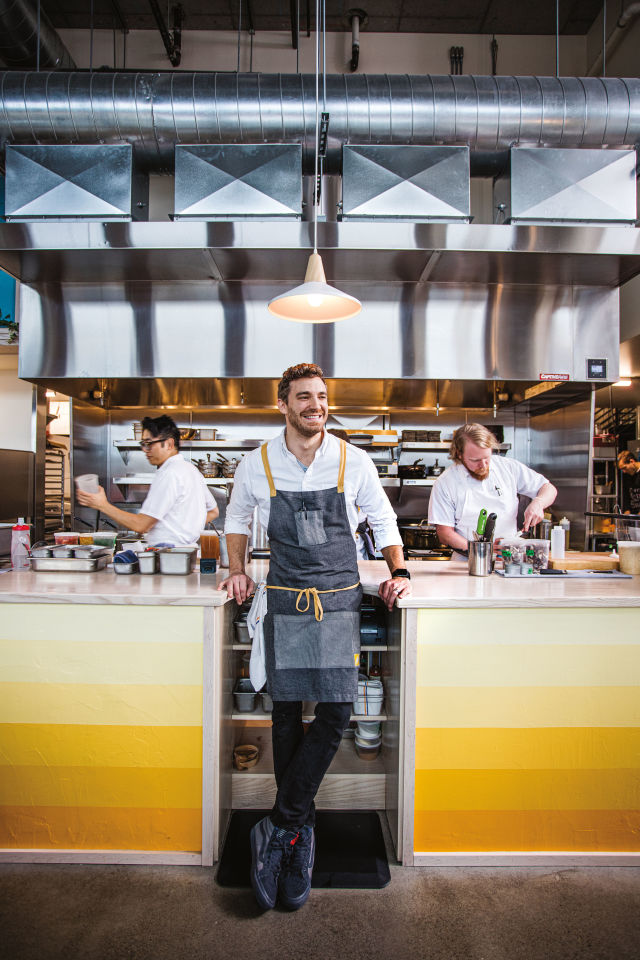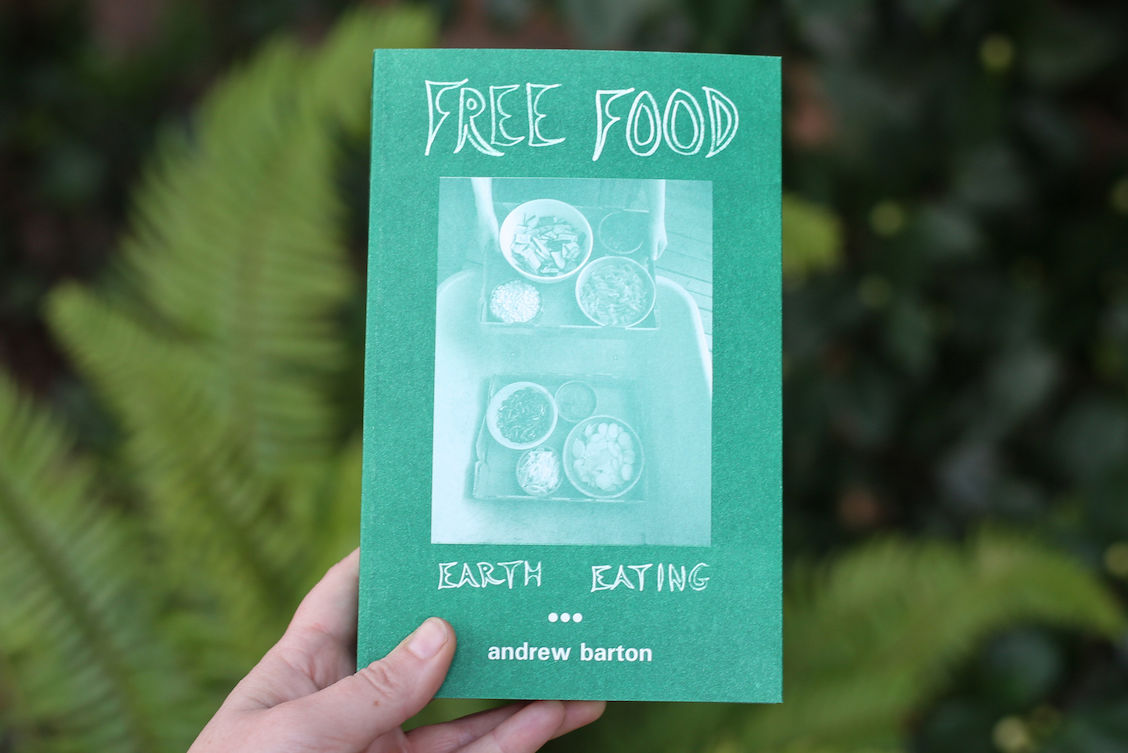Garrett Benedict Puts Heart and Soul into "Reverse Steakhouse" G-Love

Clockwise, from top: Bucatini with made-to-order tomato sauce; The ‘Spice Master,’ with cornbread, curried apple, and roasted squash; and rainbow trout in tom kha sauce
Image: Stuart Mullenberg
G-Love’s hangar steak arrives as four little charred squares of pure beef explosion, each clad in black char. On the side: caramelized onions hidden, like a Christo installation, under something best described as gouda whiz—a sweet-cheesy substance at once rich, creamy, and deliciously evil. When scheming my next visit to this mod-casual spot in Northwest’s fast-growing Slabtown, I’m thinking about that steak.
Oops. I don’t think that was the goal of Portland’s self-styled “reverse steakhouse.”
According to its mission statement, G-Love “flips the script” on traditional meat theater and our lust for he-man beef hunks—casting vegetables as the star and relegating protein, steak to fish, to side-dish status, doled out in ancillary portions. Instead of choosing rib eye or tenderloin, goes the thinking, we’ll lick our chops over peak-season produce, Romano beans to rainbow carrots, illuminated in a collection of naturalistic dishes meant for sharing (pity the diner not up for sharing these days), with nothing more than $20. The format, explains chef-owner Garrett Benedict, “is better for the planet, your wallet, your health, and not least, the way I like to eat.”
It’s not a groundbreaking idea in Portland, where vegetable worship is a way of life. But Benedict, known as G-Love since his teens, has some aces in his back pocket. He may not be a meat hog, but unlike so many free-riffing Portland chefs, the guy has chops. Once, in a crazy quest to find the country’s most interesting kitchens, he pulled shifts at 35 restaurants in 46 states. By 2015, he was a key chef at California’s creative veg tank AL’s Place when it nabbed Bon Appétit’s coveted Best New Restaurant in America tag, quickly followed by a Michelin star.

Chef-owner Garrett Benedict stands in his kitchen
Image: Stuart Mullenberg
Now, in Portland, the 32-year-old has opened G-Love, his first personal project, with a hyperlocal farm-to-table model at its center: a collaboration to grow specialty produce with Olde Moon Farm, on land in Silverton owned by his family. The goal is regular delivery, fresh from the ground. Those cultish Mountain Rose apples and Old World Ashmead kernels tucked into G-Love’s salads and desserts are from trees he planted on the property, years ago. Meanwhile, G-Love’s sous-chefs have taken turns at farm shifts, and some kitchen waste goes back to the land for compost. You want to root for this guy.
Given all this, the menu is a head-scratcher. You can find vegetables, but nothing screams vegetables. There’s no bold statement, no overt celebration—the way, say, Tusk plants a half-dozen salads front and center in combinations we’ve never seen on its Middle East menu, or how Park Avenue’s farmer-chef Karl Holl explodes our idea of veggie tempura with the likes of pickled green beans and nasturtium.
Maybe expectations are unfair. I expected the former chef de cuisine at AL’s Place, home of brine-pickled fries dunked in smoked applesauce, to lay down the word in “no rules” Portland. Or at least make a serious argument for throwing a steak under the bus.
So yeah, for now, I’m coming back for that steak. Meanwhile, G-Love contends for the city’s best salmon, complete with impressively crisp skin, a delicate interior, a soothing sauce extracted from tom kha coconut soup, and spoons of floral, tart fruit relish. (Rainbow trout sometimes gets the same treatment.) Every element is perfect. It’s a “side dish.” Order two.
A rotating bucatini is built around textbook al dente pasta and made-to-order sauces, and Ensalata Bomba juggles aged gouda, a complex seed mix, and seasonal charred fruits. A recent “charred cabbage Caesar”—hot, creamy, intense, and cloaked in chile bread crumbs, its blackened leaves flapping around the plate like possessed lasagna noodles—show where the kitchen might go with vegetable thinking. There are flubs, to be sure (steer several miles clear of the farro porridge), but, overall, G-Love’s execution is solid.

The Ensalata Bomba and braised mushrooms, plus the negroni-like Femme Fatale and The Betty, sporting a hanging vial of aged tequila
Image: Stuart Mullenberg
The room’s cozy, candlelit bar has a strong cocktail game via bartender Collin Nicholas. Femme Fatale is somewhere between a negroni and Basic Instinct—strong, sweet, sexy, and bitter. And in a kinder world, all carrot juice would taste like the Maria-Terresa, bumping with smoky mezcal and ginger. Meanwhile, at nearby ash wood tables, waiters are as upbeat as Labradors. As the night grows darker, the place thumps with happy eaters and good music.
I have high hopes for G-Love. It takes time for a kitchen to find its voice. But most important, Benedict seems to know who he is and where the industry needs to go as it reckons with toxic kitchen culture. He’s worked in some militant, soul-sucking kitchens. “It was a breaking point for me,” he says, “seeing all these miserable, downtrodden cooks.” G-Love, he vowed, would be different. “We’re not saving lives,” he says poignantly. “We’re just making dinner.”
The seeds have been planted. Now, G-Love just needs to let its garden grow.




